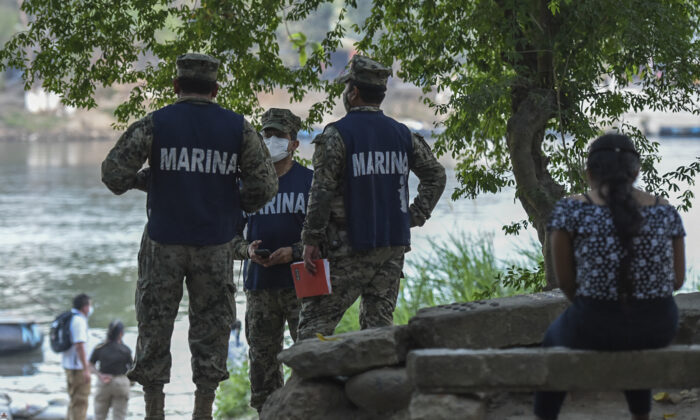Some Mexican lawmakers have argued for inviting U.S. military forces to Mexico not just to train but to fight against cartels.
Mexico is welcoming a small delegation of U.S. Green Berets to train the Mexican Marine Corps for over a month.
On Feb. 17, a Mexican Senate commission approved a plan allowing 10 members of the U.S. Army’s Seventh Special Forces Group (Airborne) to enter the country. The Senate voted 107–0 in favor of the initiative last week.
According to the plan, the U.S. instructors will arrive fully armed and train the Mexican Navy’s marine infantry on “conventional and unconventional combat tactics, techniques, and procedures.” The training spans from Feb. 17 to March 28 at a naval facility located in San Luis Carpizo, in the southern state of Campeche.
The U.S. Special Operations Command, in response to a request for comments, described the mission as part of the “normal routine, pre-planned military training with the Mexican Marine Infantry as part of long-standing U.S.-Mexico defense cooperation.”
While the initiative received broad support in the Mexican Senate, some lawmakers argued that Mexico should go beyond merely welcoming U.S. military advisers for training missions.
Sen. Lilly Téllez, a member of the opposition National Action Party, argued that the government should formally invite U.S. military forces to fight alongside Mexican troops on Mexican soil in the battle against organized crime.
“Why not accept cooperation with the United States to take action against the cartels in Mexico?” Téllez asked ahead of the vote. “Why not accept it under a cooperation agreement within a legal framework, as has been done for years in similar exercises like the one we just approved today?”
She said Mexico, on its own, has been unable to defeat the cartels. “If it could, it would have already done so, wouldn’t it?” she said.
The training program will occur as Mexico faces pressure from the United States to step up efforts against cross-border crime. Earlier this month, Mexico convinced President Donald Trump to implement a 30-day delay on a 25 percent tariff on all exports by pledging to deploy 10,000 additional National Guard troops to its northern border to curb the flow of illegal immigrants and illicit drugs, particularly the deadly fentanyl.
Adding to the pressure of looming tariffs, Trump has initiated the process of designating drug cartels as foreign terrorist organizations—a move that analysts say would grant the U.S. government greater power to act against cartel members, potentially including military action inside Mexico.
On the same day as the Senate vote, Mexican officials confirmed that two U.S. military reconnaissance planes flew around the Baja California peninsula and off the coast of Sinaloa—a historic stronghold of the Sinaloa drug cartel—on Jan. 31 and Feb. 3, presumably to monitor drug cartel activity. Mexican Defense Secretary Ricardo Trevilla Trejo stated that authorities do not know the exact nature of the flights but emphasized that the planes remained in international airspace.
Meanwhile, the U.S. military has confirmed an increase in aerial intelligence, surveillance, and reconnaissance (ISR) operations that use crewed aircraft to support anti-cartel and border security efforts.
“Recently, we’ve been permitted to increase ISR by the Department [of Defense] … to address cartel violence,” U.S. Air Force Gen. Gregory Guillot told members of the Senate Armed Services Committee at a budget hearing last week.
“We do have intelligence sharing with Mexico to show them what we have.”
Ryan Morgan contributed to this report.

